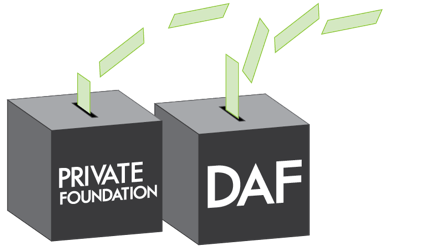Private Foundations and Donor-advised Funds
Philanthropy is an important aspect of generational wealth transfer because it allows you to earn income tax deductions and to transfer money out of your estate to avoid additional estate taxes.

If you are able to donate a considerable amount of wealth, you may have additional options for charitable giving.
Making Use of Extended Options
Philanthropy is an important aspect of generational wealth transfer because it allows you to earn income tax deductions and to transfer money out of your estate to avoid additional estate taxes. Families with considerable amounts of wealth have even more options for how to contribute to philanthropy. If your family falls into this category, you may have the opportunity to set up a private foundation or a donor-advised fund, which allow you to take a more active role in your contributions to charity.

Private Foundations
For families interested in donating a considerable amount of wealth, setting up a private foundation may be a viable option. Private foundations are completely tax-exempt, although they can only grant up to a 30 percent income tax exemption rather than the 50 percent granted by direct donation. Private foundations are typically managed by a board consisting of family members and financial advisors, who define charitable goals and manage donations. They allow this board to act as intermediaries between the donor and the chosen charity. Private foundations invest donors’ contributions, allowing the funds to grow before distributing them to charity. Unlike regular investments, these donation investments are only taxed 1-2 percent, meaning that your investments can grow faster inside a private foundation than outside. Private foundations provide a unique way for families to come together for philanthropy because they allow relatives to be named to the board of directors.
If you decide creating a private foundation is the right step for you, keep in mind that private foundations are watched closely by the IRS for misconduct. It’s essential to work with a legal and financial team when planning for a private foundation to avoid any problems with the IRS. Private foundations are also required by the IRS to make a minimum annual distribution of 5 percent of their total assets.
Private Operating Foundations
Private operating foundations differ from private foundations in that they use the bulk of the money they receive from donors to run their own charitable programs or services, rather than investing the money to give to already existing charities. Although private operating foundations may choose to donate to other charities, they must actively run their own programs to qualify as a private operating foundation with the IRS. The IRS also has very strict qualification requirements regarding private operating foundations’ net income and assets, which should be researched thoroughly and discussed with a legal and financial advisor to ensure that your foundation would meet these requirements.
Although the requirements for private operating foundations are strict, they offer many advantages as well. Unlike private non-operating foundations, private operating foundations allow donors to receive the same tax benefits as for gifts to a public foundation, meaning donors are still eligible for a 50 percent income tax deduction. In addition, private operating foundations allow families to handpick the causes they are most passionate about and to work directly within their local communities. Private operating foundations offer wealthy families a unique hybrid of public charities and private foundations.
Private operating foundations differ from private foundations in that they use the bulk of the money they receive from donors to run their own charitable programs or services, rather than investing the money to give to already existing charities.
Donor-Advised Funds (DAFs)
Similar to charitable trusts, donor-advised funds are designed to allow you to grow your donation to charity through investment. Donors, who can be individuals or groups, take donations and have a sponsor organization invest them. Although these sponsors charge fees for the creation and management of DAFs, the investment returns they produce help to build the value of the fund and generate more money for charity than a simple gift. The sponsor is usually an investment company or bank, but the donor can still advise the sponsors on which charities the donations can benefit. Unlike a private foundation, this takes the stress of investment management off the hands of the donor. DAFs also offer the full 50 percent income tax deduction for donors and are not taxed for any of their own income. In addition, DAFs have no minimum distribution requirements. In terms of generational wealth transfer, DAFs can be especially significant because they allow the donor to choose a successor advisor to continue the gifting tradition within the family.
In terms of generational wealth transfer, donor-advised funds can be especially significant because they allow the donor to choose a successor advisor to continue the gifting tradition within the family.
While DAFs do have many tax benefits that private foundations do not, they also allow the donor less control. You should consider that the official controller of donor-advised funds is the sponsor, who retains the right to disregard a donor’s choices if he or she deems a recipient charity to be unqualified.
If your family is able to donate a large amount of wealth to charity, you may want to consider one of these options. By getting your family directly involved in not only contributing to but also running a charitable organization, you can help to promote a habit of giving for generations to come.
This article was written by Advicent Solutions, an entity unrelated to Fingerlakes Wealth Management. The information contained in this article is not intended to be tax, investment, or legal advice, and it may not be relied on for the purpose of avoiding any tax penalties. Fingerlakes Wealth Management does not provide tax or legal advice. You are encouraged to consult with your tax advisor or attorney regarding specific tax issues. © 2013 Advicent Solutions. All rights reserved.
News and insights for your financial future.
Feel good about
your financial future.
Tailored guidance to help you make smart financial choices
Comprehensive planning and holistic wealth management
Advice that integrates with your values at every stage of life



